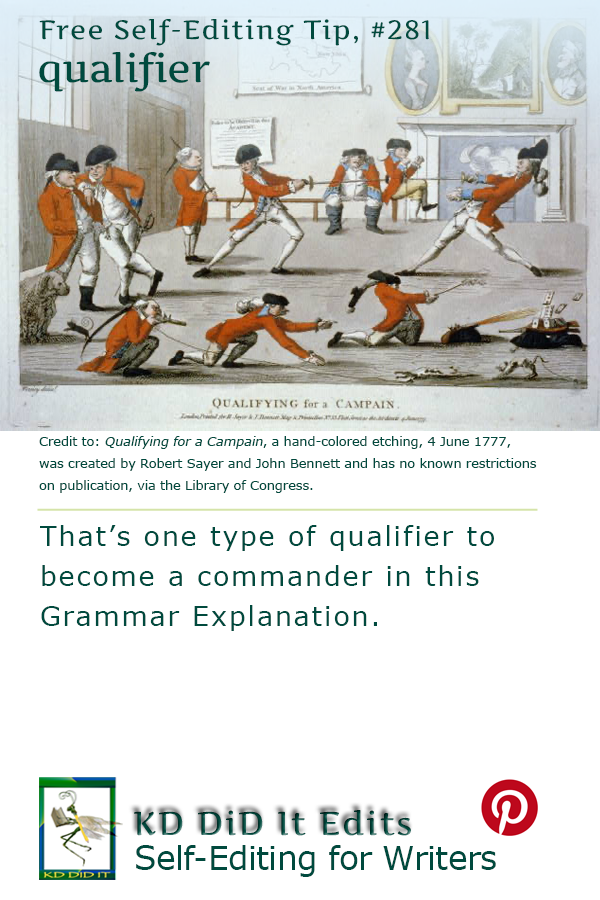Revised as of
17 Feb 2023
I tend to think of qualifiers as persuaders or a way to hedge around what might actually be possible.
In more proper grammar terms, the qualifier modifies the adverb or adjective it precedes.
Grammar Explanations is . . .
. . . an evolving list of the structural rules and principles that determines where words are placed in phrases or sentences as well as how the language is spoken. Sometimes I run across an example that helps explain better or another “also known as”. Heck, there’s always a better way to explain it, so if it makes quicker and/or better sense, I would appreciate suggestions and comments from anyone on an area of grammar with which you struggle or on which you can contribute more understanding.
If you found this post on “Qualifier” interesting, consider subscribing to KD Did It, if you’d like to track this post for future updates.
| Qualifier | |||
| Definition: A word or phrase that precedes an adjective or adverb and changing the impression of the word it modifies.
A word or phrase, especially an adjective, used to attribute a quality to another word, especially a noun. (In systemic grammar) a word or phrase added after a noun to qualify its meaning. |
|||
| List of Some Qualifiers | |||
|---|---|---|---|
| a bit a good deal a great deal a handful a little a lot a whole lot a majority a minority almost a small number appears basically break commonly could countless doubtful |
enough essentially even fairly few for a long time frequently generally great hardly any improbable indeed indicates infrequently just kind of least less likely lots of |
many may may be may have may have been maybe might might have been more most mostly nearly not all not many numerous often possibly pretty probably quite rarely rather |
really repeatedly seems seldom slightly so some sometimes somewhat sort of sporadically still suggests that too unlikely usually various very virtually well- |
| Example: | |||
|
Legend:
She wanted that much money? It was fairly new. Did you really say that? It’s quite unlikely that he’ll call. Hey, dude, this is a great deal. There’s hardly any leakage at all. Maybe we can sneak out later. There aren’t many of this type left. |
|||
C’mon, get it out of your system, bitch, whine, moan . . . which words are your pet peeves? Also, please note that I try to be as accurate as I can, but mistakes happen or I miss something. Email me if you find errors, so I can fix them . . . and we’ll all benefit!
Satisfy your curiosity about other Grammar Explanations by exploring its homepage or more generally explore the index of self-editing posts. You may also want to explore Book Layout & Formatting Ideas, Formatting Tips, Grammar Explanations, Linguistics, Publishing Tips, the Properly Punctuated, Word Confusions, Writing Ideas and Resources, and Working Your Website.
Resources for Qualifier
Some of these links may be affiliate links, and I will earn a small percentage, if you should buy it. It does not affect the price you pay.
Etier, Kathryn Elizabeth. “Words and Phrases That Can Undermine or Weaken the Message in a Good Story.” Venture Galleries. n.d. Web. n.d. <http://venturegalleries.com/blog/words-and-phrases-that-can-undermine-or-weaken-the-message-in-a-good-story/?goback=%2Egde_1697027_member_208691343>>. A useful post on how qualifiers can make or break you as an expert. And suggests limiting them to the dialog in fiction.
Nordquist, Richard. “Qualifier Words in English Grammar.” ThoughtCo. Updated on 7 July 2019. Web. n.d. <http://grammar.about.com/od/pq/g/qualifierterm.htm>.
Pinterest Photo Credits
Qualifying for a Campain, a hand-colored etching, 4 June 1777, was created by Robert Sayer and John Bennett and has no known restrictions on publication, via the Library of Congress.


